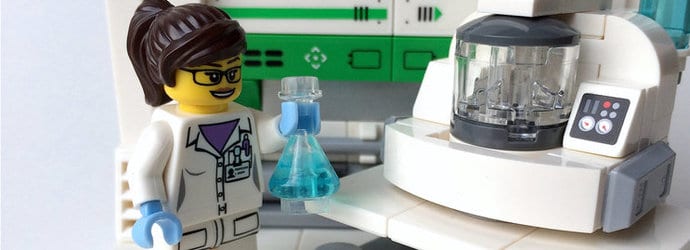The decision to make the switch from an academic lab and career to a biotech company doesn’t come easy. Many scientists are wary of the lack of independence and doing science for profit. But there are advantages too. Working in a biotech lab allows you to work on many varied and interesting projects that actually come to completion. The fruit of your labor is a brand spanking new kit and the excitement comes when the first sales start coming in.
Another advantage of working in biotech is the experience you gain on business as a whole. You learn valuable skills such as marketing, production, QC processes, operations, technical manual writing, and even a little bit of sales. And another big plus is that you have the ability to move around the company, try new jobs, and move up the ladder to a position of leadership in an organization, if you have the drive and desire.
So now you’re thinking that sounds pretty good, right? And you’re wondering if you would be a good fit for biotech science? To help you figure if you would be happy in a biotech science lab, here are some questions I came up with that you can ask yourself. If you say “yes” to all of these, then you may want to consider working in biotech.
1. Are you outgoing and enthusiastic?
Companies need scientists who are not afraid to speak up in a room of people and voice an opinion. A scientist who enjoys talking to the customers and helping them is a huge asset to a company. Enthusiasm is also important in keeping the morale of a team upbeat. And it also relates to a person who thinks positively, which is a must when trying to meet a deadline for a product launch. If you don’t have confidence in your ability to figure something out, you probably won’t.
2. Do you work well in teams?
Making a new product is a team effort. It requires the input of operations, production, marketing and R&D. No product is a success based on the efforts of a single person. A person that cannot get along with others or makes it difficult for the rest of the team to do their jobs will not be a good fit in biotech. The ability to work in teams is a must.
3. Can you handle change?
In biotech, the only thing you can count on being the same is change. It might be changing your desk (I had to pack up and unpack my cubicle four times in one year), changes to the team you work with, changes to procedures to follow that make your job more tedious instead of saving you time, and big changes such as changes in who you report too. If you prefer the status quo and like consistency, you may not be a good fit in biotech.
4. Do you like to invent things?
Have you ever wanted to be on a patent? Do you like to think up new ways to do something that no one has ever thought of before? You’ll have a chance to do that in biotech. Depending on your job, you may have the chance to be inventive in between running assays, or your whole job might just be coming up with new trade secrets or patentable inventions.
5. Do you like to travel?
There is ample opportunity to get out of the lab and go to conferences or visit customers if you desire. Marketing managers love it when scientists want to present their work in posters and spend some brief time in the booth greeting researchers. Unlike academics where travel may be limited to one meeting a year, in biotech, you can go to all of the big conferences or spend time visiting customer labs to help them with experiments when needed. Another role in a biotech company is called a Field Application Scientist (FAS). This person’s whole job is to travel to scientists’ labs and help people personally with the companies products or robotics.
6. Can you handle pressure?
Obviously there is pressure at all jobs and certainly academic life has it’s own unique pressures and stress. In biotech, the pressure can become difficult because hundreds of thousands, maybe even millions of dollars can be on the table, riding on your success. As the lead R&D scientist for a product with a projected revenue in the millions, there is pressure for you to produce a flawless product from the entire team: marketing managers, top level executives, sales people, and even within the team. Pressure also comes from too tight deadlines and problems staying on track when the research plan is set up by people other than you. When you have to tell marketing that a product launch is going to be late because something is not working, expect a storm. These are people who are not scientists so do not always have a concept of how science works and how things don’t always go according to plan.
7. Are you ok with public speaking?
Biotech science requires an outgoing personality. Since you are working in teams, you’ll need to have the confidence to speak up. And if you like to travel, you will be doing a lot of handshaking, networking, and presentations, so being comfortable in groups is important.
8. Can you multitask?
Not everyone likes to do more than one project at a time. Or handle more than one issue at a time. In biotech, this will be a must. Most people have to handle more than they are normally comfortable with so the ability to manage mulitple projects and not make mistakes will be a huge asset. If you enjoy having your plate always very full and like variety in your work, then you’ll enjoy biotech life.
9. Do you learn new methods quickly?
In biotech, you’ll need to get up the learning curve very quickly. Everyone is moving at a fast pace and in some companies, people do not have the time or patience to help new people. Everyone is multi-tasking, remember. The ideal scientist in a biotech can read a protocol and get it down pretty quick. They can get comfortable in a new surrounding quickly and get to working on the project assigned without needing a lot of training. All new people need training, of course. But a strong technical background with a lot of techniques under your belt will serve you well in a biotech company.
10. Do you have an entreprenurial spirit?
Working in a biotech company, no matter the size, requires that your mind is centered on the goals of the company: to make money. If you have ever thought about starting your own company and want to be your own boss, or if you enjoy the challenge of developing a method and watching it’s commercial success, you’ll enjoy working in biotech. Afterall, the success of a company is measured on sales so you have to be okay with making profit off your hard work. It would be nice to be able to develop a life saving method or product and give it away for free. However the livelihood of many employees at a company depends on the scientists coming up with exciting and new product ideas that people want or need. And we have to give the sales reps something to sell so they have jobs too, right?
Let me know what you think and if you have anything else to add. I am sure there are a few biotech scientists reading so share you experiences of life in biotech for our academic scientist friends. We welcome your feedback.





